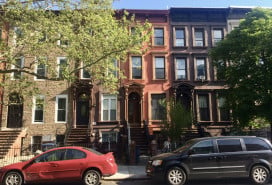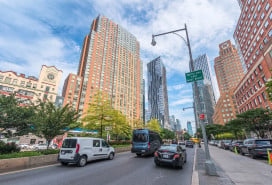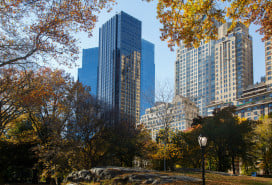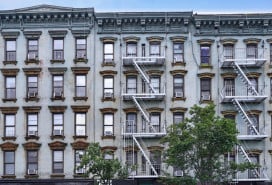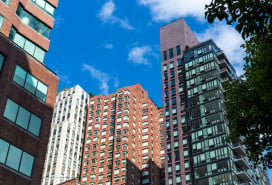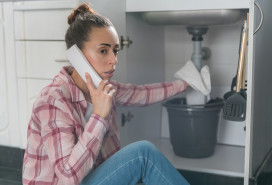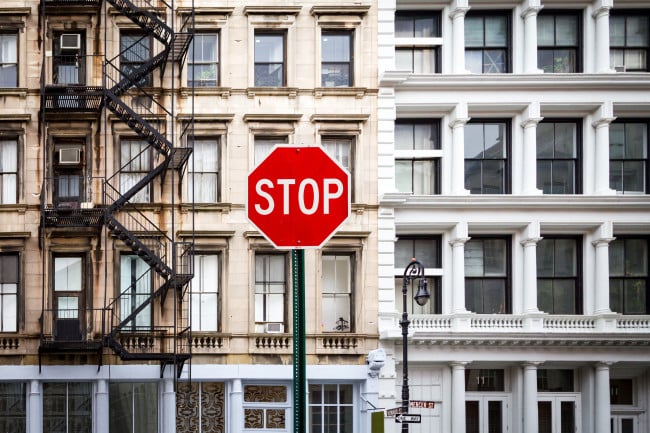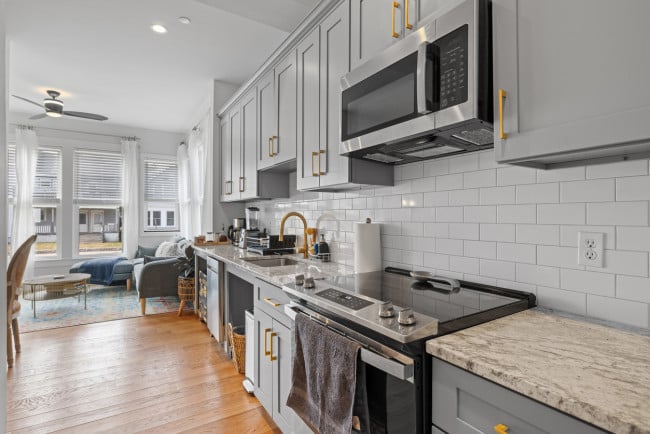Rental checklist: 20 things to look for when signing a lease in NYC
- Verify the monthly rent and make sure you’re not being overcharged for the security deposit
- Understand the building's rules about rental insurance, air conditioners, pets, and subletting
- Ask the broker or landlord for clarification on any questions or concerns before you sign
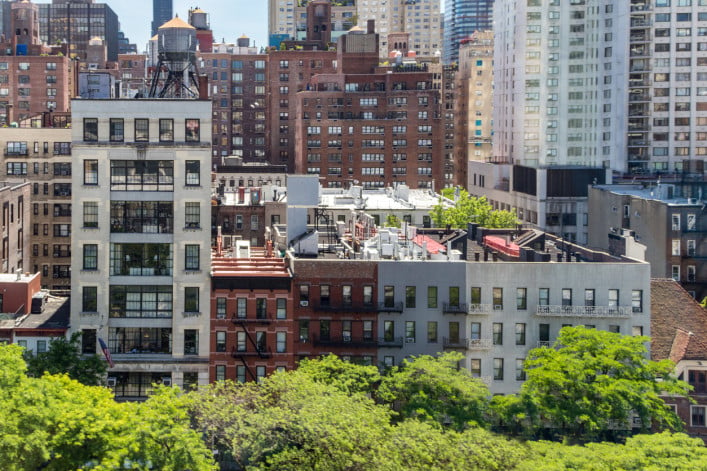
Don't be in a rush. Take the time to actually read your lease agreement—plenty of renters don't.
iStock
When moving to a new rental apartment in New York City, you may be tempted to quickly skim or—let’s be honest—skip reading the lease entirely. You can always look at it later if something comes up, right? Bad idea.
Your lease may not be the most scintillating document, but you still need to read it closely. It’s a legal contract, obligating you to specific terms and conditions.
“It’s essential to read that document and have someone with more experience—not necessarily a lawyer, but it could be the renter’s parents—look at it as well,” said Gary Malin, chief operating officer at The Corcoran Group.
Some landlords have drafted thousands of leases and are not willing to negotiate the terms, but Malin said it never hurts to ask for a change that's important to you. If the apartment has been on the market for a while or the requested change is minor or reasonable, the landlord “may be willing to make an adjustment,” he said.
[Editor's note: A previous version of this article was published in June 2024. We are presenting it again with updated information for June 2025.]
When it comes to negotiating a lease, the leverage you have depends on who the market favors at the time. In a competitive market like the current one, you'll often have to accept what the landlord offers you. In a market with high vacancies (which, believe it or not, can happen), you'll have an easier time negotiating.
Here’s what to look out for, including the policies on renewals and roommates, your liability for insurance, and whether you are paying for any utilities.
1. Verify the rent and the dates you are agreeing to
Ensure that the rent you agreed to is explicitly stated in the lease, along with the correct start and end dates. If your rental has come with a concession—like a month of free rent—make sure you understand how that affects what you will be paying each month. It might mean you don't pay the rent for the last month of the lease, or it is factored into a discount off your monthly payments.
Many landlords still largely rely on standard lease forms, which are often designed to protect the landlord more than the tenant. So don’t rush through the lease-signing process. You’ll want to make sure the details are accurate.
“People are sometimes in a hurry, and mistakes get made,” Malin said. “I think a lot of people feel so pressured sometimes to make a decision that they can end up regretting their decision.”
Double check the address and apartment number. Check on which date each month the rent is due. Be aware that a rent payment is considered late if it is received five days or more after the due date. Landlords can charge a penalty for late rent if that’s outlined in your lease, but at most they can bill you $50 or 5 percent of the monthly rent, whichever is less. There may also be a reference to who pays the broker fee, so make sure this is not a surprise.
If you have a question, ask the broker or landlord to clarify the answer before you sign.
2. Make sure the security deposit is correctly calculated
"Make sure the lease complies with current requirements," said attorney Michael L. Landsman, Esq., partner in the real estate practice group at Falcon Rappaport & Berkman.
Thanks to landmark rent reforms in 2019, the security deposit is capped at one month’s rent so you cannot be asked to pay additional rent in advance. Check that the security deposit amount is stated correctly on the lease.
Under the new laws, if you request an inspection of the apartment to document its condition before you move in, you must be given a walkthrough to observe the condition of the unit and any existing damage.
When you move out, you can also request a walkthrough and the landlord needs to give you an itemized statement of any charges within 14 days, or he or she could be liable for damages up to twice the amount of the deposit. Normal wear and tear is expected and refers to the kind of deterioration due to normal use that isn’t negligent or careless.
Your landlord must keep your security deposit in an interest bearing account, and can deduct at most 1 percent in interest as an administrative fee. The deposit must also be returned to you, plus interest and minus any itemized costs for damages, within 14 days of you vacating the apartment if you’re a market-rate renter.
3. Confirm the renewal clauses and renewal policies
If your lease has an option to renew for one or more years, check to see if there is an escalation clause. This clause would raise the rent in subsequent years and is typically based on a fixed dollar amount, a percentage of the first year’s rent, or cost of living increases.
And if you already know you want to spend more than a year at this apartment, try to negotiate your future rent and set the increase for the second or third year so you know it will be a reasonable rate.
Your landlord has to give you at least 30-days' notice if they plan to raise the rent by 5 percent or more, or if they plan to end your lease, provided you’ve lived in the apartment less than a year. If you’ve lived there for between one and two years, you’re entitled to 60-days' notice of rent hikes of 5 percent or more, or 90-days' notice if you’ve lived there for more than two years.
But you might need to give your landlord notice too, so review the renewal terms carefully.
If your lease states you need to give a renewal notice 90 days in advance by certified mail, simply calling the landlord’s office and telling them you want to renew won’t cut it. Instead of the agreed upon 3 percent increase, he may come back with an 8 percent increase, saying you didn’t give notice by certified mail. The same applies for termination, or opt-out provisions.
Also, if you landed a rent-stabilized apartment (congrats!), you’re entitled to a lease renewal every year, except in a few circumstances. Plus, your landlord can only increase your rent by the percentages set by the Rent Guidelines Board, and the lease renewal must be on the same terms and conditions as the original lease.
This topic came up during Brick Underground Office Hours—a live Q&A with tenant attorney Sam Himmelstein, a partner at Himmelstein, McConnell, Gribben and Joseph.
4. Confirm if the apartment is rent-regulated or covered under Good Cause Eviction
You should check to see if your building is covered under New York’s Good Cause Eviction law, which requires that your landlord have a reason to evict you or refuse to renew your lease and caps rent increases at 5 percent plus the consumer price index (or 8.82 percent for 2024).
While there are a lot of exceptions, including for those who pay a lot in rent or small landlords, roughly 61,000 buildings are covered under the law, according to apartment listing and review site openigloo. If you are covered, you can use Good Cause to negotiate a lower rent increase at renewal time. (Good Cause does not apply to rent-stabilized renters, who already have limits on rent increases.)
The law requires landlords to notify renters whether the rental is covered under Good Cause. But it is a good idea to do your own check, said Jennifer Rozen, managing attorney at Rozen Law Group.
“It’s always worth looking into or worth having a lawyer look into because they're going to claim that they're not covered when they are,” Rozen said.
You should receive a special lease rider if your apartment is subject to rent-stabilization, which caps rent increases each year at a rate set by the Rent Guidelines Board. But if you don't, you should request your rent history just in case your landlord is over charging you.
5. Make sure fees and costs are reciprocal
A lease drafted by a landlord may have a provision saying that if the tenant fails in their obligation—like defaulting on the rent—the landlord can be reimbursed for any legal fees and expenses in trying to resolve the situation and recoup the money.
However, if a lease provides for a landlord to recoup attorney’s fees, tenants are guaranteed that same right under New York law. If asked, most landlords will agree to an explicit clause saying fees and costs are reciprocal, Landsman said.
"It's a two-way street—if you're paying a fair market rental rate, you should be entitled to a fair and reasonable playing field," he said.
6. Have a clear notice provision in the lease
You should also know how to contact your landlord if there's a problem—whether that's a leak, mice, or a lack of hot water.
"Those clauses have to be clear so if there is ever a dispute, the other side knows precisely what they need to do to put the other side on notice," Landsman said.
Knowing how you are expected to communicate with your landlord is important if you end up having problems you want resolved. A landlord needs to be given an opportunity to make repairs if there's a complaint, but the complaint also needs to be made in the appropriate way.
7. Check the lease for a break clause
Most leases do not contain a break clause—you are expected to be in the apartment for the duration of the lease—but you should still review to see if there’s any reference to what happens if you need to leave early.
Landlords are required to make a reasonable effort to re-rent your apartment if you need to leave before your lease ends, but there’s a risk that you’ll be on the hook for the rest of the term if another tenant doesn’t take your place.
8. Be clear who pays for utilities
Some landlords—especially in buildings where apartments aren't separately metered or sub-metered—may include utilities in the rent. But usually only the water and heat are included.
“Ask what is included, and make sure the lease clearly states who is responsible for what,” Malin said.
9. Understand the requirements for rental insurance
It’s especially important to have insurance if you are renting from a condo or co-op owner. The buildings will often have rules about insurance coverage, and while the building policy or landlord’s policy might cover some things, they likely won’t cover everything, like your possessions.
“The landlord's insurance does not, despite what many people believe, cover the tenant,” says apartment insurance broker Jeffrey Schneider, president of Gotham Brokerage.
As a tenant, you must insure your own property against fire, theft, and water damage, and also carry your own personal liability coverage. Liability coverage protects you if you are sued for negligence—starting a fire that destroys part of the building or, more commonly, letting a tub or sink overflow and damaging the apartment below them.
Coverage can include accidentally leaving the sink on or flushing the toilet and having it overflow. Ask the building management what level of insurance is required.
10. Make sure your landlord allows pets
Not everyone loves animals, and having a dog or a cat can be a potential obstacle—especially if you plan on getting one after you move in. If this is the case, make sure the lease explicitly allows pets so the landlord won’t withhold his or her consent when you decide to bring home your new best friend.
If you already have a pet, ideally you have already discussed this with your landlord or the broker and your landlord grants you permission in the lease. The approval could look like this: Tenant may keep pets in the premises provided tenant obtains the prior written consent of owner. Owner hereby consents to the following pet(s): One dog.
Even if pets are allowed, be sure to find out whether there is a weight or breed restriction to avoid any problems. Just because your puppy was under the weight limit when you got him doesn't mean it can exceed that when it becomes full grown. And be aware that your landlord may charge additional rent for pets.
“Most owners will ask the breed, not just the weight, because they know that puppies grow,” Malin adds. “The best way to avoid friction is to be upfront.”
In condo and co-op rentals, review the corporate bylaws to ensure what the rules are regarding pets. For more information, read Brick’s best advice on having pets in NYC.
And, if you have an emotional-support pet or service dog, you are allowed to have a pet regardless of what your lease says. Just be prepared to provide the documentation.
11. Read the lease for rules about air conditioners
Some landlords may restrict the number of AC units you can have—or prohibit them altogether—due to outdated wiring in the building, or safety issues, or because the building is landmarked, although this is rare.
In rent-stabilized apartments or co-ops, you may be charged a fee to have air conditioners. This is generally to offset the additional cost of the electricity used. A landlord could also charge a fee for seasonal installation and removal. Even where ACs are allowed, you may need to hire someone to install the units.
12. Be clear about access to outdoor space
If you have the use of outdoor space, whether it's a terrace, garden, or roof deck, make sure it’s in your lease. The clause should include where the space is, who has rights to it, whether it is shared with others, who is responsible for maintenance, and who is responsible for damages.
If you’re subletting from an owner whose apartment has a terrace, be sure you're clear about who is responsible for maintaining it while you’re living there.
It’s important to have this spelled out in the lease, because if it is not, you might not be entitled to a rent abatement if the space becomes unusable for some reason. On the other hand, the lease may explicitly say that you should not access the roof. Make sure you check out all of the terms in your lease regarding what you can—and cannot—do on the balcony, terrace or other outside space.
13. Know your subletting, roommate, and visitor rights
Most standard rental leases require landlord approval to sublet, so you will likely need the landlord’s consent to do so. However, a landlord cannot unreasonably withhold consent.
That said, if you are going to leave the apartment permanently and want someone to take over your lease, this is called an assignment. The landlord can refuse an assignment, but if your request is unreasonably denied, you are allowed to cancel the lease.
If there is a possibility you will need to leave before your lease is up, you should discuss this with the landlord ahead of time to determine whether he or she will want you to go through the formalities or whether you can just terminate. You may also be able to work this out with a landlord before the lease is signed.
As far as roommates and significant others, you are allowed to have at least one additional occupant living with you while you’re there, even if the lease is just in your name as long as you notify the landlord. However, you are still financially liable for the entire rent. “If your subtenant doesn’t pay, you still need to pay,” Malin said.
Know that if you make any deals with a roommate, such as their agreeing to pay more for a larger bedroom space or to use their security deposit for the last month’s rent, it’s up to you to get that in writing separately from the lease with your landlord.
If the apartment is rent stabilized, you can sublet with permission, and the owner cannot unreasonably withhold that permission. If you are sharing the place, the rent must be divided equally between the number of occupants, regardless of the size of the rooms.
"Rent stabilized tenants can be evicted from 'profiting' off of the apartment if they are overcharging roommates," Rozen said.
14. Look out for repair obligations
Most leases have a clause saying a tenant cannot do alterations without the landlord's written consent. This means, if you make unauthorized changes to the apartment, you may be told to replace what’s been changed. Cosmetic work like painting might be easily remedied but major alterations would typically be a breach of the tenancy agreement.
If the landlord has agreed in advance to let you make improvements or alterations to the apartment, make sure you get this in writing in the lease. Otherwise, you will be responsible for the cost of returning the apartment to its original condition.
Rozen always recommends tenants do a walk through of the apartment before signing the lease, during which you can take note of conditions that need to be addressed. "Ask the landlord to incorporate the list of items to be addressed in the lease so that their obligation to paint or fix things is clear," she said. If the landlord fails to address the issues, you can ask for a reasonable rent abatement "until the repairs are performed," she said.
You should also look out for any clause that shifts repair responsibilities onto the tenant. In NYC, a landlord has an obligation under the warranty of habitability to make sure your living conditions aren't dangerous or hazardous. Any clause in the lease which modifies this right will typically be unenforceable.
Tenants aren’t entitled to upgrades during a tenancy but the landlord must maintain the prior level of service—especially in rent-stabilized apartments—so if there’s a breakage that isn’t your responsibility, you should challenge a lease that transfers the cost of repairs onto the tenant.
15. Understand the rules about noise and quiet hours
Some buildings might require tenants to take precautions regarding noise, such as having a certain amount of the floor covered by rugs. “Look to see if there are any obligations,” Malin said.
You should also check the building’s quiet hours, and find out whether you’re allowed to play loud instruments or host large parties, which can cause a lot of noise for your neighbors.
16. Know the rules about showings when your lease ends
It’s not uncommon for landlords to include a provision to show your apartment to prospective tenants near the end of the lease. It's the landlord's business to keep the space rented, after all. However, the exact terms of the arrangement should be looked at closely.
You may want to limit it to certain days and hours, and make yourself available. If they’re showing it without you, you might want a third party there, like a broker.
Although it is uncommon, damages can occur while the apartment is being shown, and you want the landlord to be responsible for that.
17. Check the supplemental riders to the lease
Often your lease will come with additional pages called supplemental riders. These may include requirements that allow landlords to inspect for lead paint or install window guards in units where there are children 10 and under. Also, most times landlords will include a rider with the building's bed bug history. These are standard additions to the lease.
If you’re not sure whether you live in a rent-stabilized apartment, look for a rider at the end of your lease from the Division of Housing and Community Renewal. And if you’re still not sure, request your rent history.
18. Be clear about maintenance increases and assessments
For anyone renting from a condo or co-op owner: In addition to monthly maintenance fees, many co-ops charge the owner a subletting fee. Make sure you know who will pay these costs if the charges increase.
In most cases, these costs are rolled into the rent but if either fee gets increased in the middle of a sublease, or if the building adds a monthly assessment, you will want to make sure you won’t be liable for the extra charges. Make sure this is clearly stated in the lease.
19. Be sure the lease documents apartment contents if furnished
If the apartment is furnished, the lease should also contain a list of all furniture that is to be included, as well as a confirmation that all of these items are in place when the lease begins.
Some short-term rental companies offer furnished rentals to be used as a workplace, for example a therapist's office or a room for an independent consultant. The lease terms for these spaces will look different.
Most are month to month, and include cleaning services and utilities. Still, review the same clauses as you would for an unfurnished rental.
20. Check out the building’s bed bug history
A bed bug infestation can be extremely stressful, so be sure to look at your landlord’s annual bed bug disclosure form attached to your lease. But it’s worth digging deeper into a building’s bed bug history because that form may not tell the whole story. For example, landlords do not have to disclose bed bug infestations in a property’s common areas on their required annual bed bug reports.
You can do a deep dive into whether your building has been cited for violations for bed bug infestations via Brick Report, HPD Online and NYC OpenData. If you do have bed bugs while renting, your landlord is responsible for arranging and paying for a treatment to eliminate these pests.
—Earlier versions of this article contained reporting and writing by Emily Myers. This article was updated for 2025 by Jennifer White Karp.
You Might Also Like

